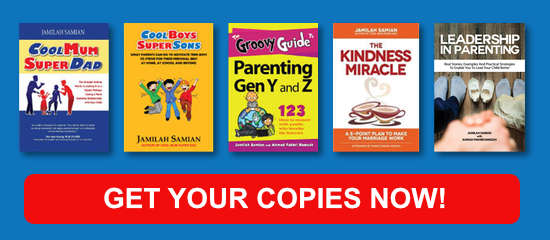I want to tell you about someone I met in my travels to Europe. Anna* was born and bred in a Muslim family. In her teens, she moved abroad and met Adam, whom she married. The couple have a 17-year-old son. Anna says, “I was raised by very harsh parents. I often say to my son, ‘Look, it’s your choice to be Muslim or not, to pray or not, to fast or not. Do as you like.’”
I was not surprised by Anna’s sharing. I had gotten used to this script: Children who had been raised by very harsh Muslim families do not feel obliged to raise their own offspring as Muslims. There are even children who had been subjected to a super strict regime of memorizing the Qur’an without understanding why, who went completely off track soon after they were left on their own. They typically grew up in families where the parents failed to engage their children right from the start. Children raised by very harsh Muslim parents, who grew up in an environment of fear or blame, who prayed and fasted just so that they fit into the majority Muslim crowd, are less likely to become good role models as Muslims to their own children.
Earlier, in another part of the world, I met with Sarah*, a working mother, who is fully aware that how she parents has a great influence on her children’s experiences and attitudes. The day we met, Sarah told me she had assigned her twelve-year-old daughter to research on the topic of “Why Respect Is Important”.
“Each week, I assign a special topic to one of my four children,” says Sarah. “After the evening prayer, everyone would gather. The child whose turn it is to present would share the highlights of his or her research. It doesn’t have to be long. Ten minutes would do. After the presentation, anyone could ask questions and we turn it into a family discussion.”
As you can see, the above two stories show two different realities. Whose children do you think are more likely to choose Islam as their way of life? Anna’s or Sarah’s?
Sarah’s style of raising her children reminds me of the Prophet’s way of engagement with the youths of his time. It was narrated that a young man came to the Prophet (Peace be upon Him) and said:
“O Messenger of Allah! Give me permission to commit zina (unlawful sex).” The people surrounded him and rebuked him, saying, “Stop! Stop!” But the Prophet said, “Come close.” The young man came to him and he said, “Sit down”, so he sat down. The Prophet said, “Would you like it (unlawful sex) for your mother?” He said, “No, by Allah, may I be ransomed for you.” The Prophet said, “Neither do the people like it for their mothers.” The Prophet said, “Would you like it for your daughter?” He said, “No, by Allah, may I be ransomed for you.” The Prophet said, ‘Neither do the people like it for their daughters.” The Prophet said, “Would you like it for your sister?” He said, “No, by Allah, may I be ransomed for you.” The Prophet said, “Neither do people like it for their sisters.” The Prophet said, “Would you like it for your paternal aunt?” The man said, “No, by Allah, O Allah’s Messenger! May I be ransomed for you.” The Prophet said, “Neither do people like it for their paternal aunts.” The Prophet said, “Would you like it for your maternal aunt?” He said, “No, by Allah, O Allah’s Messenger! May I be ransomed for you.” The Prophet said, “Neither do the people like it for their maternal aunts.” Then, the Prophet put his hand on him and said, “O Allah, forgive his sins, purify his heart and guard his chastity.” After that the young man never paid attention to anything of that nature.
I bet the young man knew having sexual relations with a woman who’s not his wife wasn’t the right thing to do. I bet he knew he’s supposed to wait till he gets married. Note that the man felt safe, not threatened, to ask the Prophet about a sensitive matter, even in the presence of others. Instead of silencing him, the Prophet acknowledged his need to be heard. He never dismissed it. The Prophet ignored other people’s negative comments about the man and instead asked him to come close, to establish rapport and develop trust. The Prophet took the time to listen and to respond respectfully. The Prophet even prayed (made duaa) for the young man at the end of the conversation. This is what engagement looks like.
Imagine what the man must have felt after his encounter with the Prophet.
Imagine what our children and youths must have felt if we were to engage them with such patience and wisdom, as role modeled by none other than the Prophet.
Compare it with a typical Muslim parent’s response, where words like “halal” and “haram” are thrown about, no discussion, no engagement. Period.
Like it or not, if we fail to engage our children and youths like the Prophet did, we will lose a number of them, not because of Islam’s fault, but because of our failure to acknowledge their concerns, to listen to them, to hear them out, to guide them, just as the Prophet did.
Times have changed. It used to be a matter of “Children are seen, not heard.” Children were once expected to keep silent. One question from a child about religion, and the answer would be, “What?! If you ask questions, it means you have doubts … an unbeliever!” But how are kids supposed to understand the value of fasting and why they must fast if we never took the trouble to engage them?
Not only that. Harsh parenting only instill fear in young hearts; but since children by nature are curious, they’ll end up asking others who might not give them the correct answer.
“Why should we fast, Mama?” A seven-year-old asks.
“Because we need to empathize with those who have nothing to eat or drink,” says the mother.
The child wonders, “Must God make some people suffer just so that we could empathize with them? So that we could feel sorry for them?”
No, my child. We fast because we need to learn self-discipline. Even if not a single soul were to suffer from hunger and thirst, we’ll still fast. Even if a huge table spread with the most delicious food sits before us and nobody is looking, you and I will still fast in Ramadan, so that we could train our hearts and minds to be patient, to say “No” when it matters. It might be piles of money, property, land instead of delicious food and drink, we will still say “No” because it’s the right thing to do.
NOTE: Names have been changed to protect privacy.









